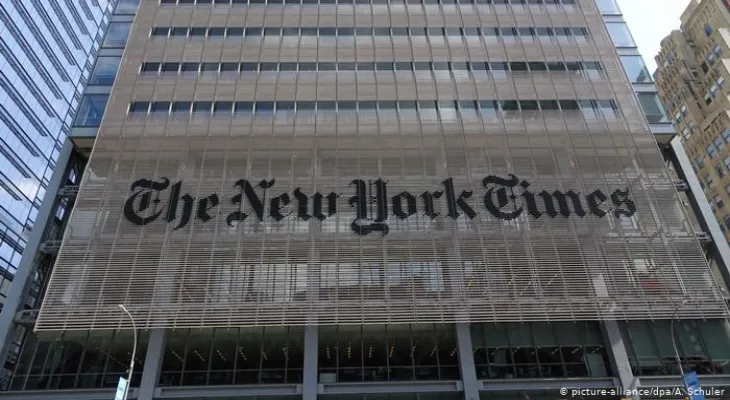Search here
Newspaper
Search here

Arab Canada News
News

Published: August 29, 2021
The commentator in The New York Times, Michelle Goldberg, wondered why circles in the American far-right welcomed the victory of the Taliban movement over America.
At the time the movement swept across Afghanistan in August, an alternative far-right group called “General Z” opened a Twitter account celebrating the movement's advance. Tweets were posted in Pashto alongside pictures of laughing Taliban fighters to depict American effeminacy.
In another tweet translated into English via Google Translate it said: “Liberalism did not fail in Afghanistan because it is Afghanistan, but because it was not real. It failed and America, Europe, and the rest of the world saw this.”
The account is now suspended but it is one example of admiration for the Taliban that appeared in American right-wing circles. Influential young white supremacist and ally of Republican representative from Arizona Paul Gosar and anti-immigrant commentator Michelle Malkin wrote on Telegram, “The Taliban are a conservative group, a religious force, and the United States is atheist and liberal, and the defeat of the American government is an unequivocal positive development.”
Through an account linked to the white supremacist group “Proud Boys,” respect was expressed for the way the “Taliban restored national religion and executed opponents.”
Mustafa Ayad, director of the Africa, Middle East, and Asia Center for Combating Violent Extremism, said, “The far-right and alt-right are enthusiastic about the Taliban who are acting harshly in Afghanistan while we are leaving under a Democratic president,” adding that these circles feel “that we have been defeated.”
The writer says that the far-right’s enthusiasm towards a militant Islamic organization is not new; several extremist groups in America praised Al-Qaeda’s attacks against America on September 11, 2001. But the situation is different now because the distance between the growing far-right, whose members dance joyfully over the Taliban’s victory, and centers of power has decreased.
Matt Gaetz, the Republican from Florida, may be a clown, but he is a congressman and was close to the former president. In a tweet on Twitter early this month, he described the Taliban in the same way Trump did, saying they are “more legitimate than the Afghan government and even the current government here” in the United States.
Twenty years ago, following the September 11 attacks, the United States launched a war marketed as a battle for democracy.
At that time, liberal democracy was generally revered in the United States, which is why we felt arrogant that we could export it by force. Many, especially on the right, felt concerned about jihadism and what it represented as a threat to a modern open society.
However, the tragic journey over the past two decades, which began with the neoconservative right advocating war with Islamists, has ended with a vanguard from the far-right envying them for everything.
Even before the terrorist attacks on Thursday, there was a kind of satisfaction among nationalist conservatives who respect the Taliban’s control over Afghanistan. While they do not sympathize with the Taliban’s brutality, they felt the defeat of international liberalism. Nationalist intellectual Yoram Hazony tweeted, “The humiliation of Afghanistan would be worth it if it led to the corruption of the old standard and gave birth to new ideas.” But what does he mean by the old standard? Well, a few days ago he tweeted, “What went wrong in Iraq and Afghanistan was first and last born of the ideas in the minds of the people who ran the show and let’s say its name: liberalism.”
Tucker Carlson from Fox News, one of America’s most influential nationalist voices, sympathized with the Taliban’s policy towards women. After the Taliban’s fall he said, “They do not hate their masculinity,” “They do not think it is toxic, and they love the patriarchal order, some of their women like it, and they have restored all this, and maybe we failed in Afghanistan because most of the neoliberal program was horrible.” He seemingly meant by the neoliberal system social liberalism, not austerity economics.
It became clear that when the government deceitfully uses liberal democracy to justify war, this democracy loses credibility through a crushing defeat. In his new book “The Age of Terror,” national security journalist Spencer Ackerman compares the bungled post-9/11 wars with the rise of Donald Trump.
He said, “Trump was easily able to express the reality of the war by pointing to what annoys the far-right: humiliation.” Humiliation fuels volatile emotions, and many have written about its role in Al-Qaeda’s rise. It is not surprising that some far-right parties respond to humiliation by identifying with images of savage masculinity. Perhaps some of this identification is for shock value, as the right is skilled at hiding its intentions, but some of it is genuine.
Adam Hadley, director of Tech Against Terrorism, a UN-backed program monitoring extremist activities online, says, “We find a lot of content showing that websites affiliated with right-wing groups in the states talk about the Taliban’s victory and how it serves their cause.”
On a site affiliated with a group of neo-Nazis, there was talk about the ability of a small band of armed fundamentalists to defeat the American empire. For other pro-Taliban right-wing groups like Proud Boys and groups outside the “Make America Great Again” (MAGA) movement, some are just fishing in troubled waters. As with movements like QAnon and Boogaloo Boys, the Taliban remain strange and a source of extremism.
As Ayad says, “The classic response to all this is to say it is marginal, but when it expands people abandon their words.”
Comments